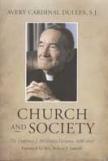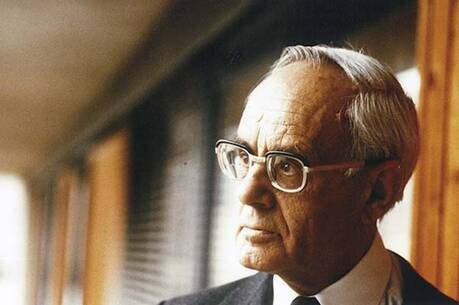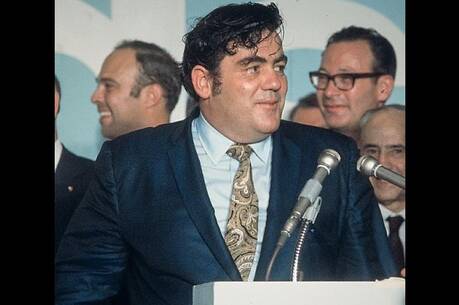Thinking With the Church
When Cardinal Avery Dulles speaks, people listen. Five years ago, a group of Catholic bishops and theologians gathered near Denver for an initial consultation on what would become Co-Workers in the Vineyard of the Lord, the U.S. Conference of Catholic Bishops’ 2005 document on lay ecclesial ministry. The meeting was warm, open, respectful. But even while bishops were offering their comments, papers rustled, cell phones were checked and throats cleared. Whenever Cardinal Dulles spoke, however, the room fell silent. It wasn’t because of his voice or his personality—neither of which is overpowering—or even primarily because of his eminent status.
Simply put, Cardinal Dulles was listened to because he taught with authority. His authority derives from his intellect, certainly, and also from his lack of personal ambition (I have never met another church leader whose ego was in such inverse proportion to his talents). More deeply, though, I believe that his authority comes from his listening: to God, to the church and its multifaceted tradition, to contemporary developments. “I want to learn before I speak,” he wrote recently, and his life’s work attests to self-effacement before the sources of theology. He is, as Robert Imbelli puts it in his fine foreword to Church and Society, “an original,” precisely in his abjuration of scholarly and personal originality.
For 20 years, since his statutory retirement at the age of 70 from The Catholic University of America in 1988, Cardinal Dulles has been the Laurence J. McGinley Professor of Religion and Society at Fordham University. His primary duty has been to deliver a public lecture each semester, with an eye toward topics that are theological, controversial and accessible to a general audience. Church and Society collects the 38 lectures he has delivered over the past two decades (minus last April’s valediction, which I hope will be included in a second edition; it can be found in America, 4/21). Substantial and rigorous, these lectures are best read occasionally, rather than sequentially. This is a book to be consulted on a given topic for a concise survey of the state of the question and for measured but firm judgments.
Although the topics of the McGinley lectures range from the death penalty to Mary to hell, Dulles’s method is invariably Thomistic and Ignatian. Like Aquinas, he evinces clarity of thought and expression, attentiveness to subtle but important distinctions, command of tradition, dispassion and a willingness to engage the strongest objections to his arguments. He shares with St. Ignatius a desire to think with the church, an emphasis on what the Jesuit Constitutions call “more solid and safe doctrine” and a presupposition to put the best possible interpretation on contrary positions and to honor whatever truth might be found therein.
The best lectures in this volume exemplify the strengths of this twofold method. “Religion and the Transformation of Politics,” for instance, delivered just weeks before the presidential election in 1992, remains as pertinent as ever on the interplay of principle and prudence in the church’s engagement in the political order. “Justification Today: An Ecumenical Breakthrough” affirms the significance of the Catholic-Lutheran Joint Declaration on the Doctrine of Justification, as it notes the important differences that remain between the two communities. “Pope Benedict XVI: Interpreter of Vatican II”—the best essay of its kind that I have read—shows the broad continuities and smaller, but real, discontinuities in Benedict’s ongoing interpretation of the council.
These lectures, like any, nonetheless have their limits. “The Papacy for a Global Church,” while rightly affirming the growing need for a strong papacy in the paradoxical face of increasing globalization and nationalism, does not take sufficient account of inculturation as the necessary enfleshment of the one Gospel in all times and places; the relationship between unity and inculturation—or between primacy and collegiality—should not be a balancing act, but a reinforcing one. And, “The Church as Communion” tends to conflate the position of those like the late Jean-Marie Tillard, who argue for the simultaneity of the local and universal churches, with those who wrongly hold for the priority of the local church over the universal church.
Cardinal Dulles’s emphasis on the continuity of tradition, moreover, can occasionally obscure elements of discontinuity or, at least, of discontinuity-within-continuity. “True and False Reform in the Church,” which takes its title from Cardinal Yves Congar’s book, perhaps does not address adequately Congar’s argument that between a “reform of abuses” (which seeks a closer adherence to already-existent church laws and structures) and a “doctrinal revolution” (which is unacceptable), there can be a need for a reform of an ecclesial “state of affairs” or “system” that hinders the church’s life. The clerical sexual-abuse crisis, I think, represents one such instance in which a “reform of abuses” is necessary but not sufficient.
And yet what must not be overlooked in Church and Society is that this ecclesiologist is thoroughly Christ-centered, something that cannot be taken for granted in a discipline ever tempted to reduce itself to ecclesiastical politics and structural management. A surprise to some readers may be that this least charismatic of men—dry, wry, reserved—is evangelical in the best sense of the word. “The most important thing about my career,” he noted in his final McGinley lecture, “is the discovery of the pearl of great price, the treasure hidden in the field, the Lord Jesus himself.” To know Cardinal Dulles—in person or through these lectures—is to encounter the conviction and the gratitude that come from being in love with Christ.
The most profound lectures reveal this all-encompassing commitment to the person of Jesus Christ: essays on the “new evangelization,” apologetics, the crucifixion, the eucharistic real presence and the Ignatian heritage in theology and in contemporary Catholicism. One cannot avoid his concern for the centrality of Christ in Catholic theology, the Society of Jesus and in the church’s prayer and mission. I sense that he would share the judgment—if not the trenchancy—of the late Cardinal Jean Daniélou, S.J., who wrote nearly 40 years ago that the greatest problem facing the church today comes from within: its timidity in proclaiming the Gospel of Jesus Christ.
Cardinal Dulles will celebrate, God willing, his 90th birthday this August. In the 20 years of his “retirement” he has written, in addition to the 38 lectures of Church and Society, eight books and scores of articles. He has done more after 70 than most theologians do in a lifetime (or three). There is no one who can replace him, yet he would be the first to recall the words of John the Baptist: “He must increase, but I must decrease.”
Read a selection of Avery Dulles writings for America.
This article also appeared in print, under the headline “Thinking With the Church,” in the August 4, 2008, issue.








